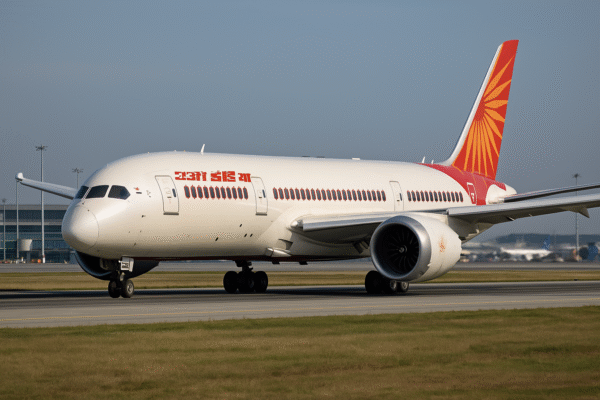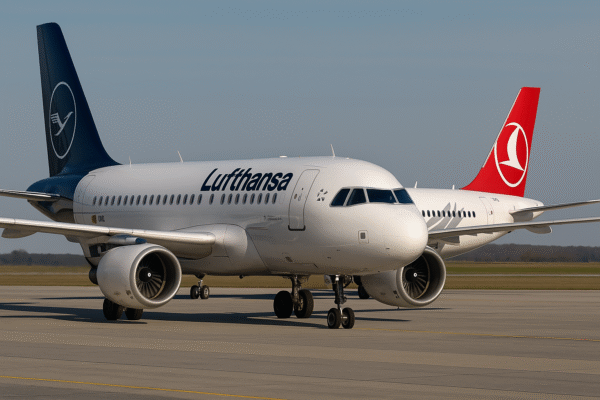Air India Cancels Delhi-Milan Flight Due to Technical Glitch, Raises Aviation Sector Concerns
In another setback for India’s national airline, Air India cancelled its scheduled flight AI137 from Delhi to Milan on Monday following a technical issue identified during pre-departure safety checks. The airline, now under the Tata Group’s ownership, cited safety as its top priority and grounded the Boeing 787 Dreamliner at Indira Gandhi International Airport (DEL) in New Delhi before any passengers had boarded.
The incident underscores ongoing reliability challenges in India’s rapidly expanding aviation industry, where aging fleets, maintenance backlogs, and increased demand continue to strain operations.
Technical Fault Grounds Boeing 787 Dreamliner
According to Air India’s official statement, routine pre-flight inspections revealed a technical malfunction that required immediate attention, prompting the airline to cancel the international journey to Milan Malpensa Airport (MXP). The exact nature of the fault has not been disclosed, but sources familiar with the matter suggest it involved avionics systems critical to flight safety.
Thankfully, the issue was detected before boarding, and no passengers were onboard at the time of cancellation. This proactive move prevented potential mid-air complications and reinforced Air India’s commitment to ensuring passenger safety.
Passenger Support and Alternate Arrangements
Following the cancellation, Air India activated contingency measures for the affected travelers. Ground staff at Delhi Airport offered multiple options including:
- Full refunds
- Hotel accommodations
- Rebooking on the next available flights
Several passengers were rebooked on connecting flights via European hubs such as Frankfurt, Paris, or Amsterdam. Those who preferred to delay or cancel their trips were granted immediate refunds. This response has been appreciated by some passengers online, even as frustration with frequent flight disruptions grows.
Aviation Sector Under the Microscope
This incident comes at a time when the Indian aviation industry is facing increased regulatory scrutiny. Following a spate of mid-air turnbacks and emergency landings, the Directorate General of Civil Aviation (DGCA) had already issued mandatory checks for aircraft across fleets, particularly for the Boeing 787 Dreamliner models in operation by Indian carriers.
Notably, this is not the first time Air India’s Dreamliner operations have faced disruption. Just weeks prior, flight AI103 from Delhi to Washington, D.C., was diverted and grounded in Vienna International Airport due to another technical fault. That issue caused delays not only on the outbound journey but also for the return flight, AI104, resulting in inconvenience for hundreds of international passengers.
Challenges in Fleet Modernization
Despite ambitious expansion and modernization plans under the Tata Group, Air India continues to battle legacy issues stemming from its pre-privatization days. While the airline has placed orders for over 470 new aircraft including Airbus A350s and Boeing 777X models, the current fleet still includes aging aircraft prone to breakdowns.
Experts note that the average age of Air India’s Dreamliner fleet is above 8 years, with some aircraft nearing a decade in service. While Boeing’s Dreamliner series is known for fuel efficiency and long-haul capability, maintenance complexity and part shortages can hinder operational reliability.
According to DGCA data from 2024, over 25 technical snags per 1,000 flights were reported by Indian carriers — higher than the global average. This has prompted calls for enhanced predictive maintenance practices, better ground support, and streamlined spare parts procurement processes.
Impact on India’s Tourism & International Connectivity
Frequent cancellations and delays, especially on international routes like Delhi to Milan — a key gateway for European tourism and business — may pose risks to India’s image as a reliable travel hub.
Milan, a popular destination for Indian leisure travelers, students, and business executives, is part of a broader European expansion strategy by Air India. Any repeated service disruptions on such routes could affect passenger confidence, impact tourism flows, and drive travelers to opt for Middle Eastern or European carriers instead.
Air India’s Statement & Road Ahead
In a media release, Air India reiterated its focus on safety and service:
“Our maintenance teams are working diligently to resolve the issue. We regret the inconvenience caused and assure all passengers that alternate arrangements are being made with care.”
While such technical issues are not uncommon in global aviation, the frequency of such events among Indian carriers is cause for concern. As Air India aims to become a global aviation leader under the Tata Group’s $400 million transformation plan, operational consistency will be vital.
The airline’s ability to handle crisis situations with transparency, proactive communication, and strong customer support will also shape its public perception.
Conclusion
As India’s skies become increasingly crowded with new routes and aircraft, ensuring fleet reliability, safety, and service excellence will be key to the sector’s growth. The recent Delhi-Milan flight cancellation may seem like a one-off, but it reflects broader systemic challenges that must be addressed urgently.
Travelers, especially those flying long-haul, will continue to monitor how Air India and other Indian airlines tackle these issues moving forward.
For more travel news like this, keep reading Global Travel Wire


















